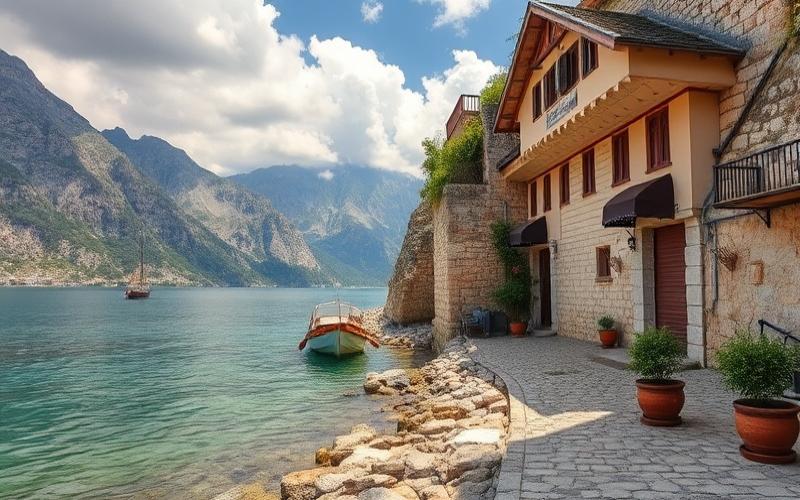
 Published on and written by Cyril Jarnias
Published on and written by Cyril Jarnias
Moving abroad is an exciting adventure, but it can become a real challenge when it comes to bringing our faithful four-legged companions. If you’re considering relocating to Albania with your pet, this article will guide you through the essential steps to ensure a smooth move and successful adaptation of your companion to their new environment.
Understanding Legal and Health Requirements
Before starting the process of bringing your pet to Albania, it’s crucial to understand the country’s legal and health requirements. Although Albania isn’t a member of the European Union, it generally follows similar rules to European countries regarding pet importation.
Animal Identification
The first step is to ensure your pet is properly identified. In Albania, as in most European countries, identification by microchip (transponder) is mandatory. If your pet isn’t yet microchipped, it’s imperative to do so before considering travel. This chip must comply with ISO standard 11784/11785 and be readable by standard devices.
Rabies Vaccination
Rabies vaccination is an unavoidable requirement for entering Albania with a pet. Your dog, cat, or ferret must be vaccinated against rabies at least 21 days before entering the country. It’s important to note that the first rabies vaccination must be administered after the microchip is implanted to be considered valid.
European Pet Passport
Although Albania isn’t part of the European Union, the European pet passport is generally accepted and greatly facilitates the process. This document, issued by an authorized veterinarian, must contain all information regarding the animal’s identification, vaccinations, and treatments. If you don’t have a European passport, an equivalent official health certificate will be necessary.
Health Certificate
A health certificate, issued by an official veterinarian from the country of origin, is required for entry into Albania. This document must attest that the animal is healthy and fit for travel. It must also confirm that all necessary vaccinations are up to date.
Travel Preparation
Once the legal and health requirements are met, it’s time to practically prepare for your pet’s journey to Albania.
Choosing Transportation Method
The choice of transportation method will depend on your departure location and personal preferences. Air travel is often the fastest option, but it can be stressful for some animals. If you opt for car travel, make sure to plan regular breaks and research the regulations of the countries you’ll pass through.
Transportation Booking
If you’re traveling by air, contact the airline well in advance to learn about their specific pet transportation conditions. Some airlines allow small animals in the cabin, while others require them to travel in cargo. In any case, a suitable carrier that complies with the airline’s standards will be necessary.
Preparing Your Pet for Travel
Prepare your pet for travel by gradually getting them accustomed to their carrier. Place their favorite toys and a blanket with your scent inside to reassure them. If your pet is prone to motion sickness, consult your veterinarian for appropriate advice or treatments.
Arrival and Adaptation in Albania
Arriving in a new country can be disorienting for both you and your pet. Here are some tips to help your companion adapt to their new Albanian environment.
Arrival Procedures
Upon arrival in Albania, you’ll need to present all necessary documents to customs and veterinary authorities. Make sure all your paperwork is in order and easily accessible. Your pet may undergo a veterinary check at the country’s entry point.
Finding a Local Veterinarian
One of your first steps in Albania should be finding a trusted veterinarian. Ask the expatriate community or your embassy for recommendations. A local veterinarian can inform you about specific health risks in Albania and advise you on any preventive treatments to consider.
Adapting to the New Environment
Albania offers a Mediterranean climate that may be very different from what your pet is used to. Ensure they always have access to fresh water and a shaded area during hot summer days. Be attentive to signs of stress or discomfort and give them time to gradually acclimate to their new environment.
Cultural Particularities and Local Considerations
Understanding the local culture regarding pets will help you better integrate your companion into your new life in Albania.
Perception of Pets
Although pet culture is rapidly evolving in Albania, it may differ from what you’re used to in your home country. Dogs and cats are increasingly popular as pets in urban areas, but you might encounter varied attitudes in more rural regions.
Local Regulations
Research local regulations concerning pets. In some Albanian cities, there may be restrictions on where dogs can be walked off-leash or specific rules regarding waste cleanup.
Pet Services
Major Albanian cities like Tirana increasingly offer pet services, including pet stores, grooming salons, and dog parks. However, these services may be more limited in small towns or rural areas.
Practical Tips for a Successful Move with Your Pet
To ensure your pet’s well-being throughout your relocation to Albania, here are some additional tips:
- Prepare a travel kit for your pet containing food, water, essential medications, and their favorite toys.
- If your pet has a specific diet, make sure you can find their food in Albania or plan to import it.
- Familiarize yourself with veterinary emergencies in your area and keep their contact information handy.
- Consider purchasing pet health insurance that covers care abroad.
- Join expatriate groups in Albania to get advice and support from other pet owners.
Conclusion
Relocating to Albania with your pet requires careful preparation, but with the right information and adequate planning, this transition can go smoothly. By following legal requirements, taking care of your pet’s health, and adapting to local particularities, you can offer your faithful companion a fulfilling new life in Albania.
Good to Know:
Albania is becoming increasingly welcoming to pets, particularly in major cities. However, it’s crucial to remain vigilant about cultural differences and sometimes limited infrastructure in certain regions. Good preparation and an open attitude will help you overcome potential challenges.
Disclaimer: The information provided on this website is for informational purposes only and does not constitute financial, legal, or professional advice. We encourage you to consult qualified experts before making any investment, real estate, or expatriation decisions. Although we strive to maintain up-to-date and accurate information, we do not guarantee the completeness, accuracy, or timeliness of the proposed content. As investment and expatriation involve risks, we disclaim any liability for potential losses or damages arising from the use of this site. Your use of this site confirms your acceptance of these terms and your understanding of the associated risks.



























